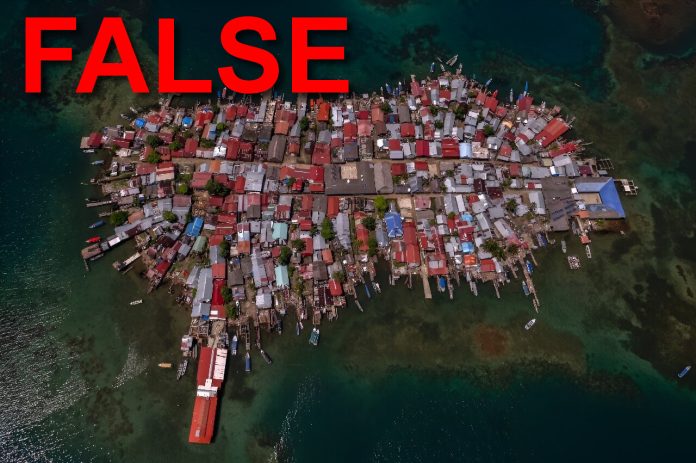The BBC’s recent article “Climate change: The Panama community that fled its drowning island,” claims that the island of Cartí Sugdupu in Panama is being swallowed by rising sea levels due to climate change. This is false. The reality is that the island’s inhabitants are not being forced to relocate because of rising oceans, but due to overcrowding, poor infrastructure, and a lack of resources—issues that have nothing to do with climate change. Furthermore, real-world examples and peer-reviewed research contradict the idea that small islands are disappearing due to rising seas. Instead, many islands are growing, adapting, and naturally shifting over time. The BBC’s report is misleading at best, deliberately deceptive at worst.
Cartí Sugdupu is one of Panama’s San Blas Islands, home to the indigenous Guna people. The BBC’s article, painting a picture of climate-induced displacement, completely ignores the fact that the island is severely overcrowded, with more than 1,000 people packed into a tiny space of just 0.028 square miles. That’s a population density higher than New York City! The primary reason the residents are moving is not rising sea levels, but poor living conditions, lack of fresh water, and a shortage of space—issues that have been pressing for decades.
Instead of addressing these fundamental concerns, the BBC presents the relocation as a direct result of climate change, despite the absence of evidence that rising seas are responsible. The sea level around Panama has been rising at an average of about 1 to 3 mm per year, a rate consistent with natural post-Little Ice Age trends, a rate that has not increased during the recent period of climate change. As such, there is no indication of an impending climate catastrophe as described in Climate at a Glance. At this pace, it would take centuries before Cartí Sugdupu would face submersion.
Some new islands are even emerging. For example in the article San Blas Reborn: New Islands Emerge Amidst Climate Change Hysteria it has been reported:
Off the coast of Maoqui in the Dutch Cays, a new island is gradually taking shape. What started as a mere speck of land, approximately 5 meters by 8 meters, has grown over the past decade to a remarkable 40 meters by 80 meters.
The BBC article implies that small islands like Cartí Sugdupu are being swallowed by the ocean, yet fails to mention peer-reviewed research demonstrating that most islands are stable or even expanding. A 2018 study published in Nature Communications examined 101 Pacific and Indian Ocean islands and found that 88 percent were either stable or increasing in size (Kench, Ford, and Owen, 2018). The processes that shape islands—sediment accumulation, reef growth, and dynamic land movement—mean that atolls and low-lying islands are not passive victims of sea level rise.
Tuvalu is a perfect example. Despite years of claims that the country would disappear, its total land area has actually grown by 2.9 percent over four decades. Similar observations have been made for islands in Kiribati, the Maldives, and the Marshall Islands. If these islands are growing or maintaining their size despite sea level rise, why would Cartí Sugdupu be uniquely doomed? The BBC refuses to acknowledge this inconvenient reality.
The real reason for the relocation of Cartí Sugdupu’s residents has nothing to do with climate change. Instead, it comes down to basic infrastructure challenges:
- Overpopulation – As seen in the head photograph, the island is overcrowded, with nowhere to expand. Unlike coral atolls that naturally grow, Cartí Sugdupu is an isolated, heavily inhabited island with no room for additional housing or development.
- Lack of Freshwater and Sanitation – Many small islands struggle with freshwater availability. The BBC ignores this and instead attributes all hardships to climate change.
- Economic and Government Decisions – Panama’s government is relocating the residents as part of a planned move, not an emergency evacuation due to rising waters.
The BBC’s reporting is a prime example of climate alarmism dressed up as journalism, with the organization pushing a narrative, while ignoring crucial facts. Rather than investigating the real reasons behind Cartí Sugdupu’s relocation—overpopulation, lack of infrastructure, and government decisions—the BBC misleadingly claims climate change is forcing its residents to relocate. It is the government that has made that decision, and not because the seas are rising at a historically unusual rate. The BBC ignores peer-reviewed research disproving its claim that islands are disappearing, fails to mention historical sea level trends, and omits crucial local factors that explain the island’s challenges. This isn’t objective reporting—it is activism disguised as news. The BBC’s audience deserves better, it deserves the truth.
















